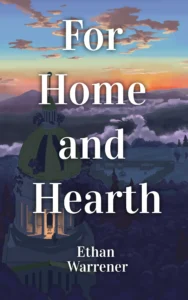For Home and Hearth by Ethan Warrener

Ella Holland wanted a simple life, but she would have settled for survival.
Life in the ravaged wilds of Appalachia is dangerous, and most folks don’t live past fifty. Even if sickness or starvation doesn’t get you, the rival clans, or shifty nomads, or the unbred monsters that roam the hills will. This is why a clan must stick together at all costs, nestled in whatever patch of peaceful land it has scratched out for itself. This is why strangers are not to be trusted.
But when a wandering drifter turns up with an army of ravenous pigmen at his heels, Ella Holland and the rest of her clan will have to confront the harsh realities they’ve kept sealed outside their walls, the lies they’ve told themselves, and even the specter of their own extinction.
For Home and Hearth Review
I was compensated with a small amount for my time and effort in reading the book and writing this review. However, all thoughts and opinions expressed are my own and are based on my honest personal experience reading the book. Nor did the publisher in any way shape or form ever pressure me to give a positive review.
For Home and Hearth takes place in the perilous, devastated Appalachian terrain, where survival is a never-ending battle. To survive the harsh external forces, clans are compelled to band together and establish close-knit communities wherever there is quiet territory available. People are suspicious of strangers and trust is a rare commodity in this harsh environment.
Ella Holland just wants a quiet existence, but life says otherwise. Her life is turned upside down when a roving drifter shows up, being followed by a swarm of pigmen. Ella and her family are forced by this sudden danger to face the hard realities they’ve avoided, consider the self-deceptions they’ve believed, and deal with the fear of their own extinction.
This specific critique delves into a more technical aspect of the writing. While this does not mean I have issues comprehending the events and dialogue, I’ve noticed instances where I needed to adapt to the text style, particularly with the dialogue. Although I eventually adjusted, I did find myself having to re-read some times multiple times because they just felt awkward for me to read especially near the beginning.
One example I can think of is when the drifter is first introduced, “This is the drifter what done saved Amos and Dale from the pigmen. He’s a friend.” Although I had no issue interpreting what the dialogue meant, it still felt somewhat awkward to interpret. It’s possible that this was just a conscious stylistic choice to establish a specific speaking style and tone, but personally, it required extra effort for me to acclimate, even though I can still understand it.
Overall, I’m happy with how the story’s post-apocalyptic environment was created. The author successfully created a tangible sense of dread, uneasiness, and general discomfort appropriate for the harsh reality of the Appalachian terrain. The way in which the inherent risks in the region were portrayed enhanced my level of immersion in the plot. It’s important to note that the book deals with some triggering subjects, and I really appreciated that none of these felt like they were included “just for the sake of it”. Rather, I can feel they all significantly enhance the sense of trepidation and add to the overall dire mood of the story.
I did feel the characters were more fleshed out than the plot, with a feeling of experiencing the characters in the setting and rather than experiencing the setting through the characters. So even though the book gives a lot of attention to world-building, it tends to be more character-centric. However, this wasn’t an issue with me because the characters were well-developed, and their proactive contribution to the plot’s advancement resulted in a cogent and captivating narrative. This is why despite how I usually favour plot-driven stories, this character-focused approach still produced a well-written and compelling story and I had no issues with it.
Unlike a story that revolves around a cast of characters resolving an apocalyptic crisis, this novel clearly focuses on a group of people who are trying to survive and thrive in a difficult environment that is actively working against them. It is noteworthy above all for being a story that highlights how resilient people can be when faced with misfortune, giving more weight to the idea of people being strong and flexible in the face of adversity than to the traditional way in which those difficulties are resolved.
If you liked this review and want to see other book reviews like this one, check out my book reviews collection!


Leave a Reply